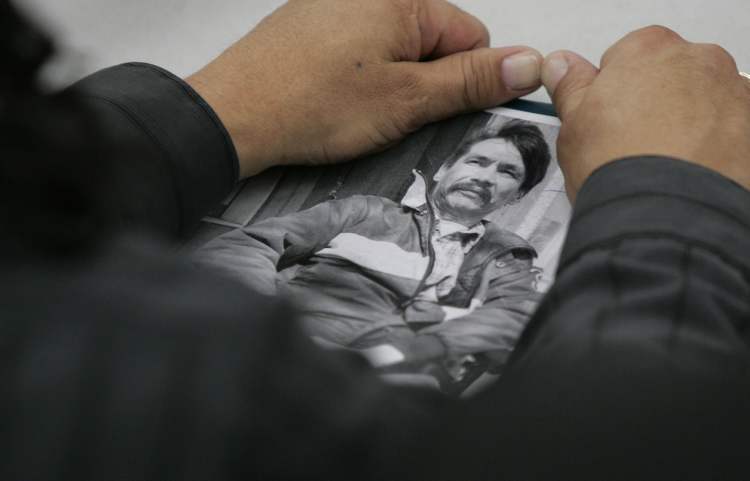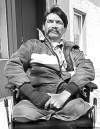Inquest or inquiry — which would be best?
Advertisement
Read this article for free:
or
Already have an account? Log in here »
To continue reading, please subscribe:
Monthly Digital Subscription
$0 for the first 4 weeks*
- Enjoy unlimited reading on winnipegfreepress.com
- Read the E-Edition, our digital replica newspaper
- Access News Break, our award-winning app
- Play interactive puzzles
*No charge for 4 weeks then price increases to the regular rate of $19.00 plus GST every four weeks. Offer available to new and qualified returning subscribers only. Cancel any time.
Monthly Digital Subscription
$4.75/week*
- Enjoy unlimited reading on winnipegfreepress.com
- Read the E-Edition, our digital replica newspaper
- Access News Break, our award-winning app
- Play interactive puzzles
*Billed as $19 plus GST every four weeks. Cancel any time.
To continue reading, please subscribe:
Add Free Press access to your Brandon Sun subscription for only an additional
$1 for the first 4 weeks*
*Your next subscription payment will increase by $1.00 and you will be charged $16.99 plus GST for four weeks. After four weeks, your payment will increase to $23.99 plus GST every four weeks.
Read unlimited articles for free today:
or
Already have an account? Log in here »
Hey there, time traveller!
This article was published 20/08/2013 (4460 days ago), so information in it may no longer be current.
Inquest or inquiry? What would be best way of examining the tragic case of Brian Sinclair?
Sinclair was a homeless, double amputee who died in 2008 after waiting more than 30 hours in an ER waiting room to see a doctor. His death is now the subject of an inquest ordered by Manitoba’s chief medical examiner.
Although the proceedings have only just begun, we are starting to see problems. The most recent flashpoint was the revelation the inquest will not see a complete report from Winnipeg police and an opinion from a prosecutor that concluded criminal charges should not be laid against any of the health-care professionals involved in the Sinclair case. Some of the report has been provided, but parts have been left out. This follows an earlier pronouncement a critical-incident report generated by the Winnipeg Regional Health Authority will similarly be withheld.

These evidentiary omissions have raised questions about whether Sinclair’s death should have been subject to a judicial inquiry, rather than an inquest. That’s a complicated question with equally complicated answers.
An inquest is a somewhat limited review of the circumstances surrounding an untimely death. They do not, as a rule, make determinations of guilt or liability. As a result, they are often criticized by those most affected by the death.
Judicial inquiries, on the other hand, are struck when there are broad, systemic issues connected to an extraordinary event that may or may not involve a death. Past inquiries investigated the justice system’s treatment of aboriginal people, the vote-fixing scandal of the mid-1990s, the death of young Phoenix Sinclair and the wrongful convictions of Thomas Sophonow and James Driskell.
Inquests and inquiries have similar judicial authority, including the power to subpoena witnesses and compel evidence. However, inquiries are typically broader in scope. They can, in some cases, issue findings of culpability, misconduct, incompetence and recommend criminal charges be considered.
Simply put, an inquiry is an inquest on steroids.
Should an inquiry have been called in the Sinclair case? It certainly seems some of the evidence being withheld from the inquest would have likely been on the table with a judicial inquiry.
Although the details of a criminal investigation may be of little interest to an inquest — which cannot assign guilt — they certainly would be relevant to a wide-ranging inquiry that could assign liability or comment on the criminality of those involved.
The issue of the WRHA critical-incident report is a different matter. Although both inquests and inquiries are empowered to obtain any evidence deemed necessary, another provincial law that deals with mistakes in the health-care system makes critical-incident reports completely off-limits.
That law allows health-care professionals to report mistakes without fear of exposure or legal repercussions. The WRHA would rather find out about mistakes and ensure they don’t happen again than punish those who authored them. This approach recognizes fewer than one in five mistakes are ever reported. Without a shield for doctors and nurses it’s feared the WRHA may never learn about some the more serious errors.
Lamentably, this law assumes all medical mistakes are created equal, even though common sense tells us that is not so. There are errors of omission and errors of commission. And within those categories, we have isolated incidents of malpractice, and chronic patterns of incompetence. These variables must be considered in any decision to withhold key pieces of evidence.
It’s also important to recognize the province has in the past released evidence to judicial inquiries that it normally considered confidential. In the Driskell case, the province willingly released legal advice provided to the attorney general even though that is normally protected under solicitor-client privilege. The province apparently decided the benefits of revealing the evidence outweighed the long-standing tradition of confidentiality.
The issue here is not whether there should have been an inquest or an inquiry, although it seems this tragedy would have been better served by the latter. The issue here is whether any proceeding examining the Sinclair tragedy can come to a fair and complete conclusion about what happened without all of the evidence on the table.
It’s certainly possible the inquest, even though it will not go as far as an inquiry, will still reveal the same details of the Sinclair case that may have been uncovered in the police investigation and the critical-incident report. The inquest has access to all of the people involved; a thoughtful examination of witnesses may produce the same degree of accountability.
However, the prime purpose of inquests and inquiries is to produce a blueprint for avoiding similar tragedies. Can any inquest or inquiry achieve that goal without all of the evidence?
The answer is an unequivocal no.
dan.lett@freepress.mb.ca
History
Updated on Tuesday, August 20, 2013 6:35 AM CDT: Replaces photo




